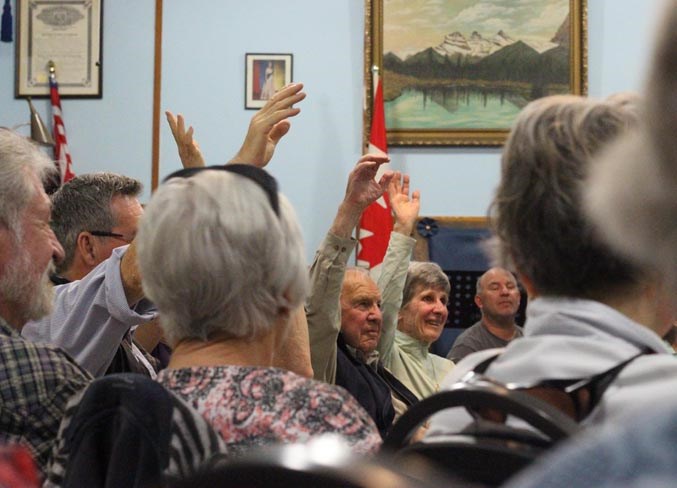“Be it resolved that separate Roman Catholic schools in Alberta lose their status as fully funded by the province, or be integrated into the non-religion-based public system.
“Be it resolved that separate Roman Catholic schools in Alberta lose their status as fully funded by the province, or be integrated into the non-religion-based public system.”
That was the topic for a friendly panel-style debate at the IDEAS meeting last Friday.
Since Canada's constitution was established, the Catholic school system has been protected as a publicly funded institution. But in Canada's modern demographic, made up with a variety of spiritual belief systems, some argue it's time to do away with it.
Four locals - Heinz Unger, Michael Kerfoot, Andy Marshall, and William Hawkins - spoke on a panel moderated by Nic David, while audience members were given the opportunity to chime in.
These were some of the reasons those at the IDEAS meeting argued for and against merging into the public school system:
FOR: It would create more schools where those who are not Catholic could attend
"It would be more neighbourhood schools," said panelist Heinz Unger arguing for the merging of the schools. He explained that if all the Catholic schools became public, students from other religious backgrounds and living in the area would be able to attend rather than potentially travelling further to a non-catholic school.
He furthered that there could be a possibility of adding religious courses to school programs so that religious teachings could still be available in a school setting.
"There's no proposal to destroy the system, it's to integrate it, to merge," Unger said.
"Just because it's been done that long ago, we don't have to continue with it ... We certainly should think about it."
FOR: There isn't a difference in morality teachings
Diana McCluskey, an audience member, said she was a teacher in both school systems and argues that the values taught in the Catholic schools are not different than their public counterparts.
"I've taught for both systems, the public and the Catholic for years - all my life - and I really didn't find that much difference in the moral outcomes of the students. We were focused on the academics. We'd have these little monthly celebrations in the Catholic system ... I don't think it helped anything."
On top of that, McCluskey said rulings made by the Bishop on issues such as HPV vaccinations should be left up to parents.
"Your faith is your own business - it doesn't have to be included in the schools," she said.
AGAINST: It wouldn't necessarily be money saving
Andy Marshall, a panelist siding that Catholic schools should continue to be funded, argued that just because the school system could be changed to public doesn't mean there would be fewer resources needed.
"If we maintained current teacher-pupil ratios, the province will need the same number of staff, the same number of buses to drive the same number of students and teach them in the same number of schools," he said. "The reality of school board budgets is 80 per cent of the operating budget goes towards instructional costs.
AGAINST: Society is "starved" of spiritual practices
Panelist William Hawkins, who spent a number of years living abroad, including 15 years teaching English in China, said he believes spirituality and faith are needed in society and should remain prevalent.
"People are starved for religious teachings and direction."




